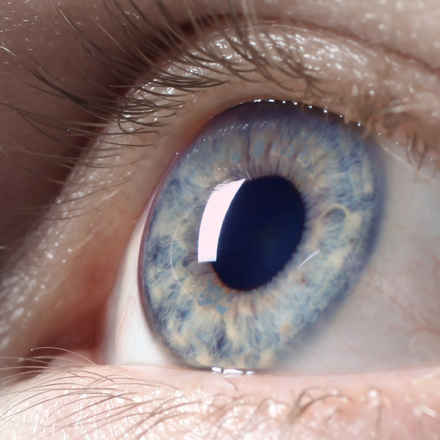Encouraging results from light therapy study for dry AMD
Posted: Friday 01 March 2024
Early results from a study assessing the effectiveness of the Valeda Light Delivery System for treating dry age-related macular degeneration (AMD), have shown promise.
The Valeda photobiomodulation technique uses three wavelengths of light to stimulate the layer of cells in the back of the eye called the retinal pigment epithelium (RPE), to keep them healthy for longer.
The LIGHTSITE III clinical trial evaluated the effectiveness of the treatment to slow the progression of dry AMD.
The results
The small study on 100 participants, with early and intermediate dry AMD, aimed to assess the impact of the therapy on visual outcomes and early changes to the back to the eye, as well as the development of late-stage dry AMD, known as geographic atrophy (GA).
After 13 months of treatment, eyes treated with photobiomodulation using the Valeda system showed significant improvement in vision compared to those who received a sham treatment. Around 55% of treated eyes experienced a notable increase in vision by at least 5 letters on the eye chart.
Additionally, the eyes that received treatment didn't show any increase in a common sign of AMD called drusen, unlike those in the group that didn't receive real treatment.
These findings highlight the potential benefits of photobiomodulation with the Valeda system as a treatment for dry AMD, but more research is needed involving a larger group of patients
Cathy Yelf, chief executive of the Macular Society, said: “Finding an effective treatment for dry AMD is an absolute priority. We’re following these trials very closely.
“We look forward to seeing a more extensive study to ensure any potential benefits of this particular therapy can be clearly demonstrated, allowing people to take it up with confidence.”
Read the full results of the LightSite III study.
Launch of a larger study
A larger study, EUROLIGHT, is now under way. EUROLIGHT will expand on this research by collecting data on the treatment outcomes of between 500 to 1,000 patients across all stages of AMD.
It is hoped the study, which will take place over a three-year period, will provide data which could help inform regulatory bodies, such as National Institute for Health and Care Excellence (NICE).
Looking for more information about Valeda or other red light therapies?
Contact our helpline on 0300 3030 111 or email help@macularsociety.org
Or listen to Professor Glen Jeffrey’s talk on Light therapies to improve declining eyesight.
Dry age-related macular degeneration (AMD)
Dry age-related macular degeneration (AMD) is a gradual deterioration of the macula as the retinal cells die off and are not renewed.
Our research projects
Since 1987 the Macular Society has invested around £10 million in over 100 research projects.




